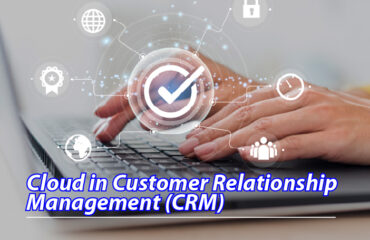Cloud in Marketing and Sales – Chapter 8

8.1 Introduction
Marketing and sales are the engines that drive growth in any business. For small businesses, however, competing with larger companies has historically been difficult. Limited budgets, fewer staff, and lack of access to advanced tools often meant relying on word of mouth, basic advertising, or manual sales tracking.
The rise of cloud-based marketing and sales tools has changed the game. Today, a small bakery, consultancy, or online shop can access the same powerful platforms used by global enterprises, but at a fraction of the cost. From automated email campaigns and social media scheduling to e-commerce integrations and customer analytics, the cloud empowers small businesses to market smarter, sell faster, and build stronger relationships with their audiences.
8.2 The Shift to Cloud Marketing
Marketing has evolved from being largely traditional—billboards, radio, and print—to being digital-first. With this shift, cloud platforms have emerged as the backbone of modern digital marketing strategies.
Cloud-based marketing platforms allow businesses to:
-
Run targeted advertising campaigns across social media and search engines.
-
Automate email marketing with personalization.
-
Schedule and manage social media posts in advance.
-
Analyze campaign performance in real time.
For small businesses, the advantage is clear: instead of spending thousands on mass advertising with uncertain returns, cloud platforms provide precision, data, and affordability.
Example:
A small fitness studio can use Mailchimp to send automated class reminders, Hootsuite to schedule Instagram posts, and Google Ads to target local customers—all managed from the cloud without hiring a marketing department.
8.3 Cloud Tools for Sales Enablement
Sales is about building trust and closing deals, but managing pipelines manually can be chaotic. Cloud-based sales tools streamline the process by:
-
Tracking leads and prospects.
-
Automating follow-ups with reminders or emails.
-
Providing visibility into each stage of the sales funnel.
-
Offering analytics to identify bottlenecks and opportunities.
Example:
A software startup uses HubSpot CRM to track leads from website sign-ups, nurture them with email sequences, and automatically notify the sales team when a lead is “warm.” This ensures no opportunity slips through the cracks.
8.4 Popular Cloud Marketing and Sales Platforms
Mailchimp
Best known for email marketing, Mailchimp also offers audience management, customer journeys, and analytics dashboards.
Example: A boutique coffee roaster sends seasonal promotions to its email subscribers, resulting in a 20% increase in repeat purchases.
HubSpot Marketing & Sales Hub
HubSpot integrates marketing automation with CRM, giving small businesses a seamless way to attract leads and close deals.
Example: A consulting firm uses HubSpot to publish blogs, capture leads through landing pages, and nurture prospects with automated campaigns.
Shopify (E-commerce Sales)
Shopify isn’t just an online store—it also provides marketing tools, abandoned cart recovery, and analytics, making it a complete cloud-based sales platform.
Example: A home décor shop launches an online store on Shopify and uses built-in email campaigns to re-engage customers who left items in their carts.
Hootsuite & Buffer (Social Media Management)
These tools allow businesses to plan, schedule, and analyze social media posts across multiple platforms from one dashboard.
Example: A local bakery schedules daily Instagram posts about new menu items and uses analytics to track which promotions bring in the most foot traffic.
Google Ads & Facebook Ads Manager
Both platforms allow businesses to run highly targeted ad campaigns, reaching customers based on demographics, interests, or location.
Example: A wedding photography studio uses Facebook Ads to target newly engaged couples within a 50km radius, doubling its booking rate.
8.5 Case Studies: Cloud Marketing and Sales in Action
Case Study 1: The Local Restaurant
A small restaurant struggled to bring customers back after their first visit. By using Mailchimp, they set up automated “thank you” emails with discount vouchers for returning customers. Within three months, repeat visits increased by 25%.
Case Study 2: The E-commerce Startup
A startup selling eco-friendly products used Shopify for sales and HubSpot for lead nurturing. Abandoned cart emails alone recovered 15% of lost sales, significantly boosting revenue.
Case Study 3: The Service-Based Business
A small law firm used Google Ads to run targeted campaigns for legal consultations. By linking ads to a landing page built with HubSpot, they converted online leads into booked appointments, reducing reliance on referrals.
8.6 Benefits of Cloud in Marketing and Sales
The cloud provides small businesses with tools that offer benefits far beyond traditional methods:
-
Cost Efficiency: Affordable subscriptions replace costly traditional advertising.
-
Scalability: Campaigns can be scaled up during peak seasons and scaled down afterward.
-
Personalization: Customer data allows targeted messages instead of generic ads.
-
Data-Driven Decisions: Real-time analytics help identify what works and what doesn’t.
-
Integration: Many platforms connect with CRMs, accounting software, and e-commerce platforms for a complete workflow.
Example:
A florist connects Shopify (sales), QuickBooks Online (finance), and Mailchimp (marketing). Sales automatically update financial records, while customer data feeds into personalized email campaigns.
8.7 Challenges in Cloud Marketing and Sales
While the benefits are compelling, small businesses may encounter challenges such as:
-
Over-Subscription: Using too many platforms without integration can create confusion.
-
Learning Curves: Marketing automation and analytics tools may be complex for beginners.
-
Ad Fatigue: Running the same campaigns repeatedly can reduce effectiveness.
-
Privacy Regulations: Businesses must comply with laws like GDPR when handling customer data.
The key is to start small, choose tools that integrate well, and focus on building meaningful customer relationships instead of chasing every new trend.
8.8 Conclusion: Competing on a Global Stage
Cloud marketing and sales tools have leveled the playing field. A small coffee shop can now run digital campaigns as sophisticated as a multinational brand, targeting audiences precisely and tracking results in real time. For small businesses, this means marketing and sales are no longer limited by size or budget—they are limited only by creativity and strategy.
By embracing tools like Mailchimp, HubSpot, Shopify, and Google Ads, entrepreneurs gain access to world-class capabilities once reserved for corporate giants. More importantly, they can use these tools to connect with customers authentically, build loyalty, and accelerate growth.
The next chapter will explore another area where cloud computing reshapes small business operations: IT infrastructure, including virtual servers, networking, and hybrid solutions.



